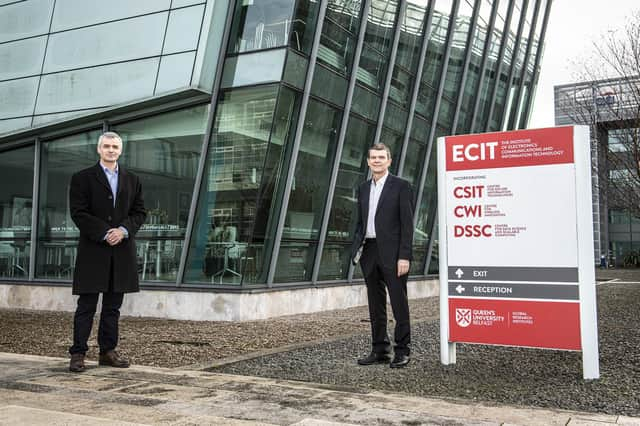Software tackles cybersecurity amid pandemic


New software to tackle cybersecurity risks increased by remote working has been developed through a partnership between Queen’s University Belfast and Belfast-based tech company Ampliphae.
The Centre for Secure Information Technologies (CSIT) at Queen’s and Ampliphae, both based at Catalyst, formerly known as the Northern Ireland Science Park, have been working on a two-year Knowledge Transfer Partnership (KTP) which took on extra significance in the last year with the huge growth in the number of people working at home during the pandemic.
Advertisement
Hide AdAdvertisement
Hide AdCSIT shared its world leading cyber-security expertise with Ampliphae, a specialist in building cloud-based software, to enable the development of a new product called SaaSGuard, which addresses emerging security threats against cloud applications.
SaaS (Software as a Service) is a method of software delivery that allows data to be accessed from any device with an internet connection and a web browser. Ampliphae developed a suite of SaaSGuard automated tools to view and control how all SaaS applications are adopted by users. Using this information the technology can help organisations to keep their customer and staff data safe while staff work remotely.
Knowledge Transfer Partnerships (KTPs) aim to help businesses to improve their competitiveness and productivity through the better use of knowledge, technology and skills within the UK knowledge base. This project was co-funded by UKRI through Innovate UK and Invest Northern Ireland.
The project was led by Dr Phil O’Kane, cyber security researcher at CSIT and Neil Sinclair, operations and delivery lead at Ampliphae, and with Queen’s graduate Linghang Sun as the KTP Associate.
Advertisement
Hide AdAdvertisement
Hide AdDr Phil O’Kane explained: “The Covid-19 crisis has seen a sudden acceleration in the use of cloud-based products as companies across the globe have reacted to the need to keep working while moving staff out of offices to work remotely from home. This exposes individuals and companies to a wider range of new and emerging cyber-security threats and risks.
“We were delighted to collaborate with Ampliphae on this project, which enabled the mutual transfer of expertise and know-how between the university and the company, resulting in new features and opportunities for Ampliphae’s product.”
Trevor Graham, CEO, Ampliphae, continued: “Remote working staff are particularly vulnerable to cyber security threats, and there has been a significant increase in cyber-attacks directed against remote workers. By addressing Cloud-based cyber threats, CSIT and Ampliphae have helped to protect organisations and their staff as they deal with the transition to home-based working.”
Stephen McComb, Knowledge Transfer Advisor from KTN stated: “The KTP demonstrated the value of Knowledge Transfer and collaboration. Ampliphae and CSIT, working together through the project were able to advance their positions as cyber experts in this very fast changing domain. Businesses are already successfully using the technology to help them adapt to the changing digital demands Covid-19 has presented.”
Advertisement
Hide AdAdvertisement
Hide AdDr Vicky Kell, Invest NI’s Director of Innovation, Research and Development, added: “This success further demonstrates the power of collaboration and the benefits that can be achieved by investing in innovation. Ampliphae’s new product will benefit many companies, due to the increase in remote working during the pandemic.”
The Centre for Secure Information Technologies (CSIT), Queen’s University Belfast, is the UK’s Innovation and Knowledge Centre (IKC) for cyber security, and the UK’s largest cyber security focused university technology research, development and innovation centre.
CSIT brings a unique approach to academic engagement and delivering impact with industry in the UK and further afield. An Industrial Advisory Board (IAB) of companies and strategic government partners plays a key role in defining the research challenges undertaken by CSIT, whilst a cadre of industrially experienced engineers help accelerate innovation to market. This creates collaborative opportunities for researchers to work with start-ups, scale-ups and large corporations and on solving societal challenges.
A message from the Editor:
Thank you for reading this story on our website. While I have your attention, I also have an important request to make of you.
Advertisement
Hide AdAdvertisement
Hide AdIn order for us to continue to provide high quality and trusted local news on this free-to-read site, I am asking you to also please purchase a copy of our newspaper whenever you are able to do so.
Our journalists are highly trained and our content is independently regulated by IPSO to some of the most rigorous standards in the world. But being your eyes and ears comes at a price. So we need your support more than ever to buy our newspapers during this crisis.
With the coronavirus lockdown having a major impact on many of our local valued advertisers - and consequently the advertising that we receive - we are more reliant than ever on you helping us to provide you with news and information by buying a copy of our newspaper when you can safely.
You can also enjoy unlimited access to the best news from across Northern Ireland and the UK by subscribing to newsletter.co.uk
Advertisement
Hide AdAdvertisement
Hide AdWith a digital subscription, you can read more than five articles, see fewer ads, enjoy faster load times, and get access to exclusive newsletters and content. Visit https://www.newsletter.co.uk/subscriptions now to sign up.
Thank you